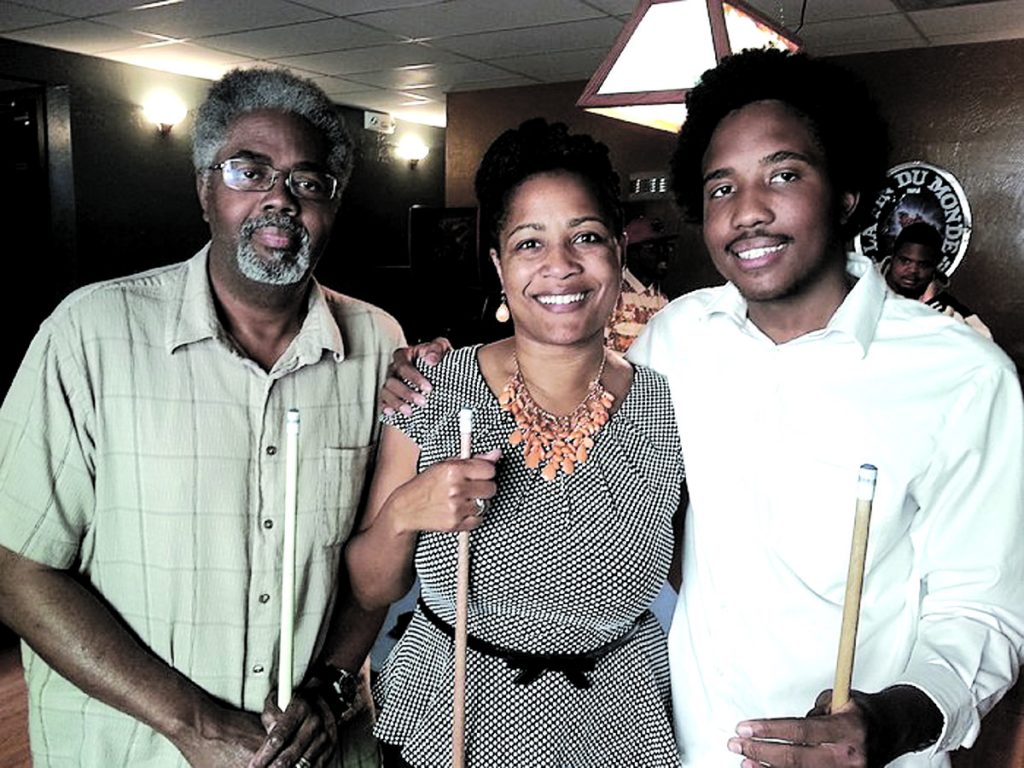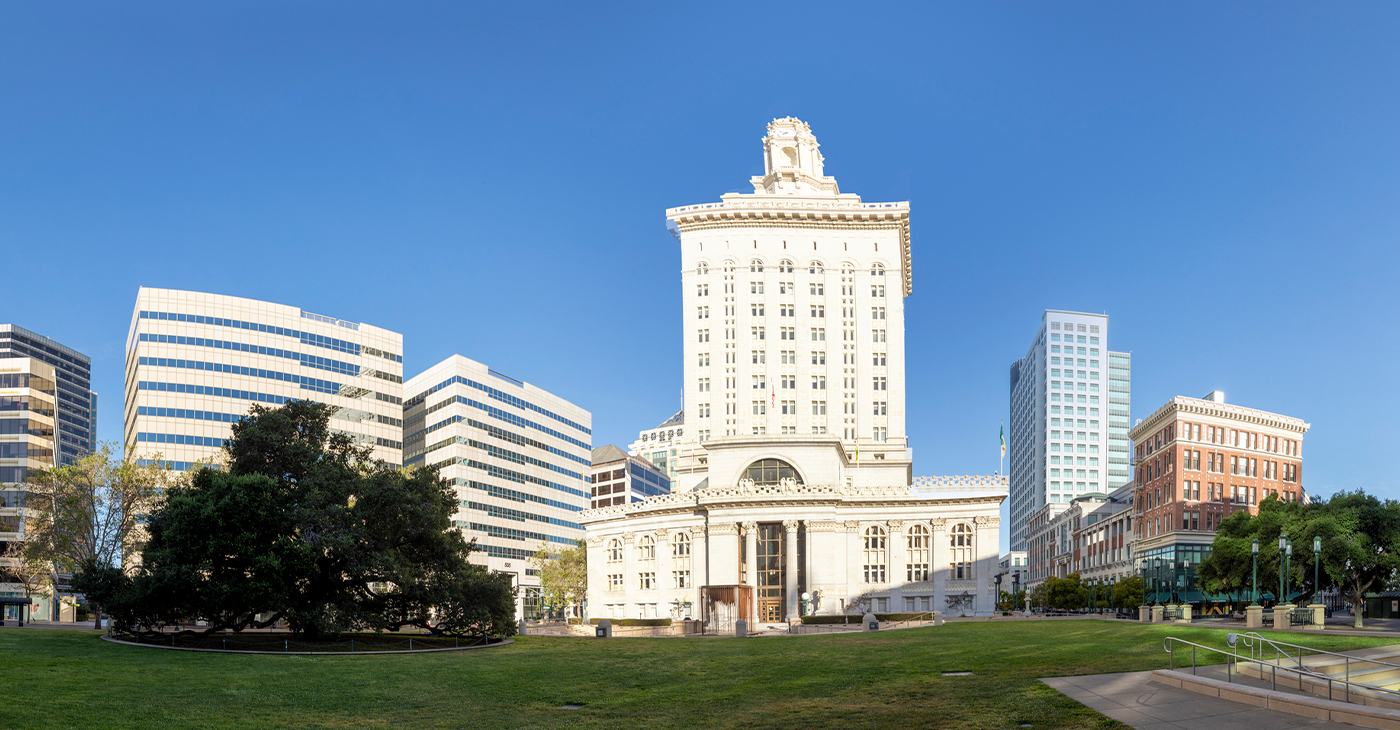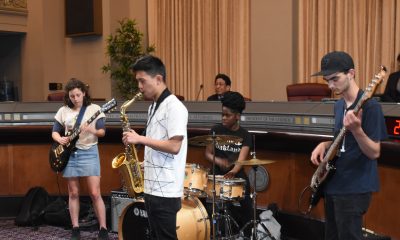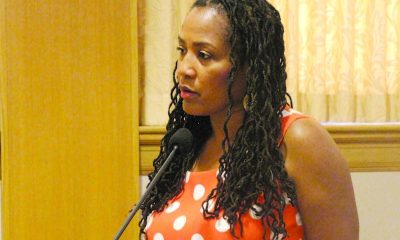City Government
Memorial for Victor McElhaney

The life of Victor McElhaney was celebrated in a homegoing on March 23, 2019, at Oakland’s Temple Hill auditorium where hundreds gathered in his name.
Just 21 years old when he was killed in a foiled robbery attempt near the University of Southern California where he was attending the Thornton School of music, friends, family, teachers and clergy recalled Victor’s bright light, deep love of life and even deeper belief that music could heal the world and he was going to be a a part of it.
On the stage, easels that held pictures and photos of Victor in different stages of his young life were interspersed with at least a dozen wreaths of white flowers and a small altar had doughnuts, apparently a favored food.
“We claim this moment as sacred time as we lay our prince to rest and we support him as he begins his ancestral journey, ” said Rev. Andriette Earl of Heart and Soul Center of Light who served as officiant.
Bishop Michael King of the Church of Jesus Christ of Latter-Day Saints also welcomed the family and friends who nearly filled the 1,600-seat auditorium.
Through various speakers Victor was exhorted as a son of Oakland as much as he was the son of his parents, District 3 Councilwoman Lynette Gibson McElhaney and Clarence McElhaney.

Victor McElhaney (right) celebrates his 21st birthday at Luka’s Taproom in Oakland with his family.
Led by Dale Anthony and Monica Moore, the praise team of his parents’ home church, True Vine Ministries, brought the house to its feet with gospel classics “He’s Able,” and “Victory,” where the members held up ‘V’ signs for Victor.
Scripture was quoted, prayers of comfort said but the grief remained palpable: So full of pain, the speakers, singers and praise dancer seldom remembered to introduce themselves.
Jennifer Johns took the stage unannounced and sang a cappella. Blues singer Faye Carol, one of Victor’s teachers, sang ‘Holy Land,” and trombonist Angela Wellman of the Oakland Public Conservatory of Music spoke of the young drummer’s ability to keep the music ‘in pocket.’
Known collectively as ‘The brothers,’ 11 young, Black men wearing black armbands printed with white V’s took the stage as one to talk about their friend.
Shavonne Bryant said Victor’s true gift was that “he didn’t see any point in living in anything but his truth. And because of that there was no room for doubt on your side either.
“The beautiful storm that was Victor McElhaney will continue to touch us,” she said.
The ability to insert intentional change into every moment that Bryant described is wholly linked to a gift for imagination so vital that for Keturah Nobles, a game they played from childhood into adulthood is so weighted with love that even with Victor’s death she will not lose it.
But Pastor Zachary Carey could not help but deviate from the call for celebration. “The violence has to stop,” he said. In the U.S., the real emergency is not at the border but in urban America from Chicago, Oakland, Philadelphia, Stockton and Los Angeles.
Over and over he asked the audience to call Victor’s name, exhorted all to remember his name and then he said something perhaps prescient. That like Emmett Till’s death became a spark igniting the Civil Rights movement, may Victor McElhaney’s be the one that brings the casual violence in the Black community to an end.
Everyone has to do their part, Carey said. “If you see something, say something. We can’t let his name be replaced by another ‘breaking news’ headline.”
He called on Mayor Libby Schaaf, Congresswoman Barbara Lee and Supervisor Larry Reid, who were all present, to do their part as politicians and noted that Victor’s mother, McElhaney-Gibson had fought to get a department of violence prevention in Oakland.
Activism
Oakland Post: Week of December 25 – 31, 2024
The printed Weekly Edition of the Oakland Post: Week of December 25 – 31, 2024

To enlarge your view of this issue, use the slider, magnifying glass icon or full page icon in the lower right corner of the browser window. ![]()
Bay Area
Glydways Breaking Ground on 14-Acre Demonstration Facility at Hilltop Mall
Glydways has been testing its technology at CCTA’s GoMentum Station in Concord for several years. The company plans to install an ambitious 28-mile Autonomous Transit Network in East Contra Costa County. The new Richmond facility will be strategically positioned near that project, according to Glydways.

The Richmond Standard
Glydways, developer of microtransit systems using autonomous, small-scale vehicles, is breaking ground on a 14-acre Development and Demonstration Facility at the former Hilltop Mall property in Richmond, the Contra Costa Transportation Authority (CCTA) reported on social media.
Glydways, which released a statement announcing the project Monday, is using the site while the mall property undergoes a larger redevelopment.
“In the interim, Glydways will use a portion of the property to showcase its technology and conduct safety and reliability testing,” the company said.
Glydways has been testing its technology at CCTA’s GoMentum Station in Concord for several years. The company plans to install an ambitious 28-mile Autonomous Transit Network in East Contra Costa County. The new Richmond facility will be strategically positioned near that project, according to Glydways.
The new Richmond development hub will include “over a mile of dedicated test track, enabling Glydways to refine its solutions in a controlled environment while simulating real-world conditions,” the company said.
Visitors to the facility will be able to experience on-demand travel, explore the control center and visit a showroom featuring virtual reality demonstrations of Glydways projects worldwide.
The hub will also house a 13,000-square-foot maintenance and storage facility to service the growing fleet of Glydcars.
“With this new facility [at the former Hilltop Mall property], we’re giving the public a glimpse of the future, where people can experience ultra-quiet, on-demand transit—just like hailing a rideshare, but with the reliability and affordability of public transit,” said Tim Haile, executive director of CCTA.
Janet Galvez, vice president and investment officer at Prologis, owner of the Hilltop Mall property, said her company is “thrilled” to provide space for Glydways and is continuing to work with the city on future redevelopment plans for the broader mall property.
Richmond City Manager Shasa Curl added that Glydways’ presence “will not only help test new transit solutions but also activate the former Mall site while preparation and finalization of the Hilltop Horizon Specific Plan is underway.
Alameda County
Last City Council Meeting of the Year Ends on Sour Note with Big Budget Cuts
In a five to one vote, with Councilmembers Carroll Fife and Janani Ramachandran excused, the council passed a plan aimed at balancing the $130 million deficit the city is facing. Noel Gallo voted against the plan, previously citing concerns over public safety cuts, while Nikki Fortunato-Bas, Treva Reid, Rebecca Kaplan, Kevin Jenkins, and Dan Kalb voted in agreement with the plan.

By Magaly Muñoz
In the last lengthy Tuesday meeting of the Oakland City Council for 2024, residents expressed strong opposition to the much needed budget cuts before a change in leadership was finalized with the certification of election results.
In a five to one vote, with Councilmembers Carroll Fife and Janani Ramachandran excused, the council passed a plan aimed at balancing the $130 million deficit the city is facing. Noel Gallo voted against the plan, previously citing concerns over public safety cuts, while Nikki Fortunato-Bas, Treva Reid, Rebecca Kaplan, Kevin Jenkins, and Dan Kalb voted in agreement with the plan.
Oakland police and fire departments, the ambassador program, and city arts and culture will all see significant cuts over the course of two phases.
Phase 1 will eliminate two police academies, brown out two fire stations, eliminate the ambassador program, and reduce police overtime by nearly $25 million. These, with several other cuts across departments, aim to save the city $60 million. In addition, the council simultaneously approved to transfer restricted funds into its general purpose fund, amounting to over $40 million.
Phase 2 includes additional fire station brownouts and the elimination of 91 jobs, aiming to recover almost $16 million in order to balance the rest of the budget.
Several organizations and residents spoke out at the meeting in hopes of swaying the council to not make cuts to their programs.
East Oakland Senior Center volunteers and members, and homeless advocates, filled the plaza just outside of City Hall with rallies to show their disapproval of the new budget plan. Senior residents told the council to “remember that you’ll get old too” and that disturbing their resources will only bring problems for an already struggling community.
While city staff announced that there would not be complete cuts to senior center facilities, there would be significant reductions to staff and possibly inter-program services down the line.
Exiting council member and interim mayor Bas told the public that she is still hopeful that the one-time $125 million Coliseum sale deal will proceed in the near future so that the city would not have to continue with drastic cuts. The deal was intended to save the city for fiscal year 2024-25, but a hold up at the county level has paused any progress and therefore millions of dollars in funds Oakland desperately needs.
The Coliseum sale has been a contentious one. Residents and city leaders were originally against using the deal as a way to balance the budget, citing doubts about the sellers, the African American Sports and Entertainment Group’s (AASEG), ability to complete the deal. Council members Reid, Ramachandran, and Gallo have called several emergency meetings to understand where the first installments of the sale are, with little to no answers.
Bas added that as the new Alameda County Supervisor for D5, a position she starts in a few weeks, she will do everything in her power to push the Coliseum sale along.
The city is also considering a sales tax measure to put on the special election ballot on April 15, 2025, which will also serve as an election to fill the now vacant D2 and mayor positions. The tax increase would raise approximately $29 million annually for Oakland, allowing the city to gain much-needed revenue for the next two-year budget.
The council will discuss the possible sales tax measure on January 9.
-

 Activism4 weeks ago
Activism4 weeks agoOakland Post: Week of November 27 – December 3, 2024
-

 Activism2 weeks ago
Activism2 weeks agoButler, Lee Celebrate Passage of Bill to Honor Congresswoman Shirley Chisholm with Congressional Gold Medal
-

 Activism2 weeks ago
Activism2 weeks agoPost News Group to Host Second Town Hall on Racism, Hate Crimes
-

 Activism2 weeks ago
Activism2 weeks agoDelta Sigma Theta Alumnae Chapters Host World AIDS Day Event
-

 Business2 weeks ago
Business2 weeks agoLandlords Are Using AI to Raise Rents — And California Cities Are Leading the Pushback
-

 Activism3 weeks ago
Activism3 weeks agoOakland Post: Week of December 4 – 10, 2024
-

 #NNPA BlackPress4 weeks ago
#NNPA BlackPress4 weeks agoNational Action Network Announces 2025 Inauguration Day Rally
-

 Arts and Culture1 week ago
Arts and Culture1 week agoPromise Marks Performs Songs of Etta James in One-Woman Show, “A Sunday Kind of Love” at the Black Repertory Theater in Berkeley

























































